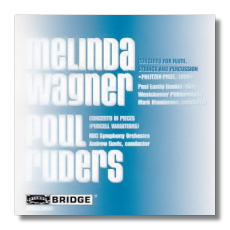
The Internet's Premier Classical Music Source
Related Links
- Latest Reviews
- More Reviews
-
By Composer
-
Collections
DVD & Blu-ray
Books
Concert Reviews
Articles/Interviews
Software
Audio
Search Amazon
Recommended Links
Site News
 CD Review
CD Review
Melinda Wagner / Poul Ruders

Concertos
- Melinda Wagner: Concerto for Flute, Strings, and Percussion (24:30)
- Poul Ruders: Concerto in Pieces "Purcell Variations" (17:14)
Paul Lustig Dunkel, flute
Westchester Philharmonic Orchestra/Mark Mandarano
BBC Symphony Orchestra/Andrew Davis
Bridge 9098 DDD 55:51 Includes interviews with Ruders & Wagner
This recording, for me, is the find of the year. (Literally, as well as figuratively. Browsing in Virgin's megastore in Chicago, I came across it shelved with Richard Wagner.) Until now I had never heard a note by either composer. Wagner won the Pulitzer Prize last year, for this work, but I see only one previous recording listed for her in Schwann. The work by Ruders, a Dane, was performed at the Proms, and he has a number of other recordings, including two symphonies, a concerto for violin and one for piano. His opera, The Handmaid's Tale was recorded for release this year.
Both works on this disc are exciting and repay repeated listening. The partial origins of each would be more nakedly revealed if they had been named Music for Strings, Percussion and Flute, and Variations and Fugue on a Theme of Purcell, though I would not want to overstress this; both are fresh and inventive. Wagner openly admits that Bartók's work was a model with respect to the instrumentation (as well as Bernstein's Serenade); she did not want to overwhelm the flute with brass or other woodwinds. In Ruders' case, the work was commissioned on the occasion of the tercentenary of Purcell's death and the fiftieth anniversary of Britten's young Person's Guide. Ruders felt that he might "just as well jump out the window" as choose the theme Britten did; the one he selected was the "fast, swinging, Ho-Ho-Ho witches ' chorus" from the beginning of Act II of Dido and Anaeas.
Wagner's Concerto for Flute, Strings and Percussion has a vigorous, attention-getting opening that could fairly be called Bartókian. She invokes strong rhythms and uses the percussion section effectively throughout the work, including bells, piano, triangle – and celesta. There is a also a lyrical gentleness, particularly in the long, lovely middle movement, which is quiet and lightly scored, with only a few intense moments. It is marked "Sad, Simple, Warm." The first movement is marked "Playful"; it has its hushed moments. The vigorous finale is simply marked with the quarter-note value of 100. The flute displays its full range – or nearly – and the melodic phrasing definitely keeps one's attention. The soloist is fine, as is the orchestra.
Ruders' Concerto in Pieces, a concerto for orchestra, has ten variations culminating in a "finale fugato" or a "minimalist fugue" and shows some of the composer's eclectic tendencies, most charmingly illustrated with a (4th) variation for alto saxophone (my favorite.) Variation 5 is for tuba with horns, trumpets and trombones (quieter than you might expect); 6 is a drumming variation and 7 (andante lamentoso) for harp, flute, trumpets, vibraphone and celeste; #8 is for high strings and muted trumpet; 9 is a pizzicato with double base harmonics. The finale is for full orchestra with unison horns and trumpets rousingly playing Purcell's theme at the end.
A bonus on this recording is a pair of interviews with the composers. One learns that Wagner, the recipient of several prestigious awards and a considerably greater number of rejection letters which gave her calluses to work with, wrote songs as a child which formed part of a musical play, "We Love Recess," her first performed work. As a young child she also listened constantly to Amahl and the Night Visitors and West Side Story. Ruders got a later start and was largely self-taught as a composer. His interest in the baroque came out of his work as an organist. Ruders' musical aims are to "entertain, enrich and disturb."
I am looking forward to hearing other works by Melinda Wagner and Paul Ruders With two such composers – among others – writing today, I do not fear for the future of classical music.
Copyright © 2000, R. James Tobin




















